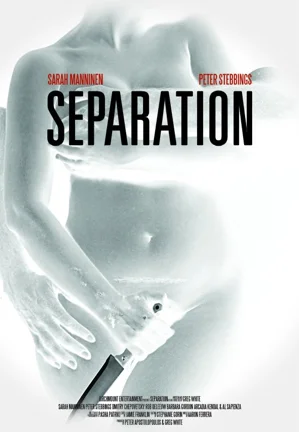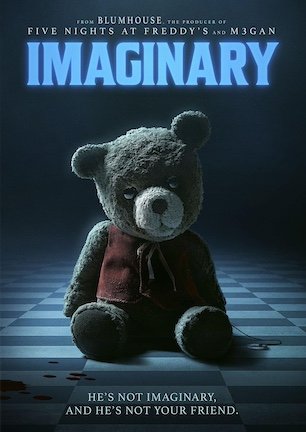Studio: Gravitas Ventures
Director: Greg White
Writer: Greg White
Producer: Peter Apostolopoulos, Greg White
Stars: Sarah Manninen, Peter Stebbings, Dmitry Chepovetsky, Rob deLeeuw, Barbara Gordon, Arcadia Kendal, Al Sapienza
Review Score:
Summary:
A couple struggling to repair their marriage discovers that they are being monitored after moving into a new suburban home.
Review:
Few phrases are overused in entertainment criticism more than “slow burn.” Unfortunately for my self-imposed moratorium on its use, few terms succinctly describe writer/director Greg White’s film “Separation” better than that tired phrase. Yet while other movies forget the latter half of “slow burn” and end up only as the former, “Separation” remembers to keep its atmosphere on a constant simmer, even though it takes some time to light the first match. The pace is intentional, but anyone waiting impatiently for that burn to erupt into a boil may begrudgingly discover that this is not that kind of story.
Peter Stebbings, who qualifies for a shortlist to don the Ziggy Stardust makeup should a David Bowie biopic ever be made, plays Jack, a suburban family man struggling to repair his deteriorating relationship. Sarah Manninen is wide-eyed wife Liz, caught in a perpetual daze of prescription meds and unfettered optimism as coping mechanisms for a past tragedy. Although the couple should be focused on settling into their secluded new home with their little girl Angie, it is what they do not have and what they have lost that weighs heavier on their minds. Starting over in ominously named Hemlock Lake proves to be another challenge. Jack and Liz have unwittingly joined the local Neighborhood Watch program, not as volunteers, but as the ones being watched.
Like many low-budget independents by first time feature filmmakers, “Separation” is a mixed bag comprised mostly of well-composed elements, although it is not without its share of warts. Cinematography is one example.
Keeping a story visually engaging when the majority of moments feature just two primary characters in a singular location is never an easy task. “Separation” manages to spare unnecessary doldrums with carefully structured camera movements. Scenes flow thanks in part to a camera that is nearly always panning, tilting, dollying, or sweeping. This unanchored camera style goes a long way towards opening up a tightly condensed setting.
On the flip side, there are scenes when the color timing changes abruptly or the exposure is not reactive to a lighting blowout. These quibbles will sail right by the less technically oriented and those who simply do not care, but this absence of polish undercuts the otherwise committed technical aspects of the film.
There are other instances where “Separation” feels like it does not possess the full confidence in its abilities to pull off its goal, which is to pull the rug out from an unsuspecting audience with a slow-build thriller. The story adds at least one character that does not quite fulfill its purpose as a red herring. It is as though the script was unsure it could keep suspicious viewers off the scent without peppering the plot with casual distractions. Several shots are so on the nose that they suggest a fear of viewers not “getting it” to the point where cutting a second time to a realty sign and racking focus onto a bicycle are simply too obvious as tells.
Despite rough edges related to dollar signs and inexperience, “Separation” keeps its cards close to the chest when it comes time for the big money hand. This is a film that is remembered or ignored based on how well it pulls off its grand illusion. In that regard, “Separation” is a success.
Instant gratification types will be fidgeting in their seats long before the first act concludes. But it is the third act where the film excels. The steady stride and seemingly meandering tone is all a wind-up to the final revelation. Better than that is the fact that the movie’s twist is not simply a tease of the brain, but it is a tease of the emotions.
What makes “Separation” effective is that it is more than just a mind game out to convince anyone of its cleverness. “The “ah-ha” moment does not come with that grinning satisfaction of learning how a magician fooled you. It is more like discovering that a trusted friend known for years has unexpectedly stabbed you in the back. “Separation” challenges more than the abilities of perception. It confronts how easily people make assumptions when the senses are deceiving. The ending delivers an uncomfortable feeling of being woken to a previously unperceived reality.
Do not attempt to learn more about the story beforehand. Do not try to move too far ahead of the characters. Allow “Separation” to weave its narrative and then marvel at the mood it creates by the end.
Review Score: 70







If you want to see impossible amounts of blood explode crimson colors like the world’s worst version of a gender reveal, well, “Abigail” at least has that.